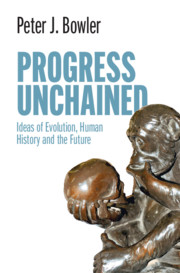Book contents
- Progress Unchained
- Progress Unchained
- Copyright page
- Contents
- Figures
- Preface
- 1 Introduction
- Part I The Ladder of Progress and the End of History
- 2 From the Chain of Being to the Ladder of Creation
- 3 The Hierarchy of Humanity
- 4 Progress to Paradise
- 5 Ascent to Utopia
- 6 End of an Era?
- Part II Towards a World of Unlimited Possibilities
- Bibliography
- Index
6 - End of an Era?
from Part I - The Ladder of Progress and the End of History
Published online by Cambridge University Press: 11 February 2021
- Progress Unchained
- Progress Unchained
- Copyright page
- Contents
- Figures
- Preface
- 1 Introduction
- Part I The Ladder of Progress and the End of History
- 2 From the Chain of Being to the Ladder of Creation
- 3 The Hierarchy of Humanity
- 4 Progress to Paradise
- 5 Ascent to Utopia
- 6 End of an Era?
- Part II Towards a World of Unlimited Possibilities
- Bibliography
- Index
Summary
Although the twentieth century saw a transition to a less goal-directed model of progress, efforts were still made to defend the older vision in which humanity was the predetermined end of evolution and a particular social order the goal of social progress. Christian thinkers still tended to think of evolution as a process driven by cooperation rather than struggle, with humanity and a spiritually mature society as the goals. Even within a Darwinian framework, it has been argued that evolution is subject to constraints that leave something like humanity as the only possible end-point. From the opposite ideological position, Soviet Marxism preserved the image of a sequence of developmental stages leading to the future utopia. With the collapse of the Soviet Union there were suggestions that free-enterprise capitalism is the final end-point of social evolution.
- Type
- Chapter
- Information
- Progress UnchainedIdeas of Evolution, Human History and the Future, pp. 149 - 170Publisher: Cambridge University PressPrint publication year: 2021

